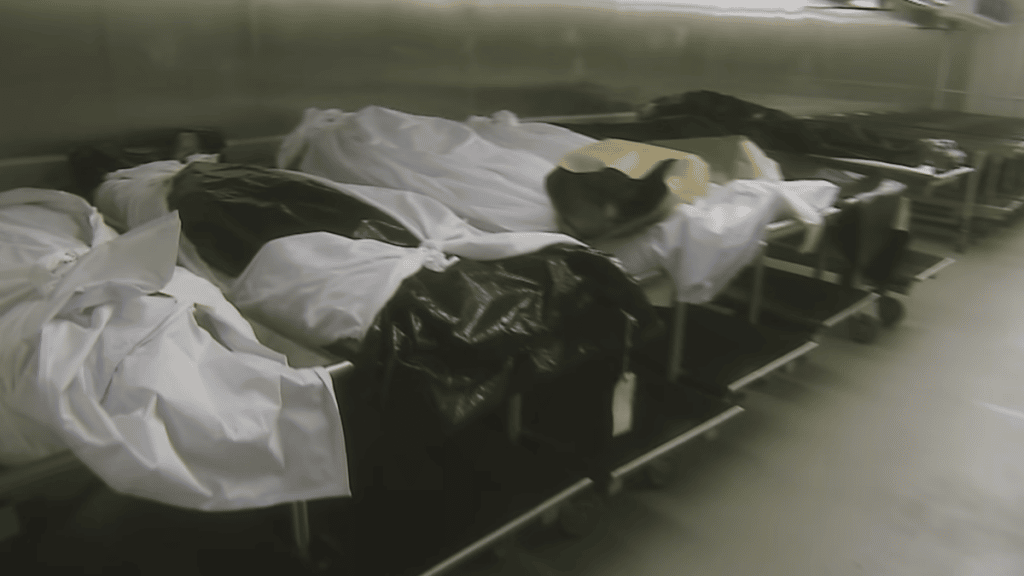Read also:
How to Watch FX Live Without CableHow To Watch AMC Without CableHow to Watch ABC Without CableHow to Watch Paramount Network Without CableAlex Gibney’s two-part documentary lays out a compelling case that the opioid epidemic was no accident.
A running joke in early episodes of The Simpsons was McBain, an action hero parody. In one scene, a group of rich people celebrate their new product SWANK (a product 10 times more addictive than marijuana), and end with a toast: “To human misery!” After watching Alex Gibney’s two-part documentary, The Crime of the Century, it’s hard to not think this scene was based on Purdue Pharmaceutical’s owners, the Sackler family, toasting the creation of OxyContin.
The opioid epidemic has been a hot topic for many years, with hundreds of thousands dying from overdoses due to addiction often started with OxyContin that moves to Fentanyl and heroin. But as the opening sequence informs us, the lucrative profits from opium is hardly a modern invention, with Britain going to war to protect company profits. Gibney lays his cards out on the table early on: the pharmaceutical companies and corrupt politicians are to blame for these deaths.
The Crime of the Century makes the argument that executives knew about the high potential for abuse and obfuscated the narcotics’ addictive traits. With court documents and interviews with public health officials, doctors, and former pharma sales reps, Gibney details how greed and a desire for increasing profit have cost almost half a million lives.

Almost amazingly, a few interview subjects represent those who helped push the epidemic along, and Gibney makes sure we know who are and aren’t the bad guys. Dr. Lynn Webster, who founded Lifetree Pain Clinic, has plenty of interview time with the filmmakers. Gibney alternates between Webster justifying his practices and the husband of one of Webster’s patients to whom he prescribed a seemingly obscene number of opioids.
Even if you agree with Crime’s core tenet that the opioid epidemic was orchestrated, these interviews make you wonder about the spin given to some interview subjects to get them to agree to appear on film. Gibney also plays hip-hop music describing opioid abuse over video of primarily white sales reps in suits, so as to reframe the narrative of drug pushers away from street gangs to major corporations.
The first episode is laser-focused on Purdue Pharma as well as the Sacklers. While their OxyContin helped kick off the opioid epidemic, Gibney also explores the other ways the Sacklers have manipulated the medical market. Gibney juxtaposes the way they used Madison Avenue marketing tactics to sell drugs as a lifestyle, with their philanthropy and art collection that the family used as PR. With these groups as the antagonists, the first episode gels its pieces into an arc that’s cohesive and easy to follow.
Gibney lays his cards out on the table early on: the pharmaceutical companies and corrupt politicians are to blame for these deaths.
The second episode, on the other hand, is broader in scope and feels a bit aimless. While drugmaker Insys and its unscrupulous founder, John Kapoor, are common threads throughout the episode, Gibney gives more screen time to the victims of the epidemic and the law enforcement agencies attempting to combat the scourge. While illuminating, these dual narratives don’t always mesh well together. Each of the two episodes has a two-hour runtime, and where the first episode feels like it could be a feature-length documentary on its own, the second feels more like two one-hour documentaries combined.
The overall result is a documentary that sheds a lot of light but hardly feels surprising. Even as you’re shocked by what you learn (like Purdue encouraging a man to take 50 OxyContin pills a day to prove it was safe), it’s hard to imagine anyone being truly shocked by how greed has led to so much suffering. Needless to say, The Crime of the Century is an often grim yet compelling viewing. It’s an essential watch for anyone who wants to know how we got to where we are, and Gibney opens the door for other conversations like the huge issue of marketing medications like any other commercial product. Still, it doesn’t really leave the audience with the feeling things will get better. It seems like lusts for opioids and money are two of humanity’s most enduring qualities.
The Crime of the Century is now streaming on HBO Max.